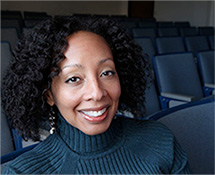Research Week: 'Giselle Corbie-Smith featured in WSW'
In honor of UNC's research week, we're revisiting some of our favorite stories. Every week is research week here at NC TraCS!
11/2/2016
Giselle Corbie-Smith is a social medicine professor in the UNC School of Medicine, as well as director of the Center for Health Equity Research and NC TraCS’ Community Academic Resources for Engaged Scholarship (CARES) Services. She is nationally recognized for her scholarly work on the practical and ethical issues regarding involvement of minorities in research.

When you were a child, what was your response to this question: “What do you want to be when you grow up?”
I actually didn’t have a childhood dream of being anything in particular. My parents stressed the idea of education as the path to whatever you wanted to be in life.
Describe your research in five words.
“Everyone deserves to be healthy.”
Share the pivotal moment in your life that helped you choose research as a career path.
During residency, I saw what I perceived as disparities in care by race and social class. Fortunately, I was in an environment at Yale that was accepting, even encouraging of us asking these tough questions about the process of care and differential health outcomes. But it was a convergence of several experiences in that affirming environment that led me to research. I read a paper and saw a talk by Nicole Lurie, who expressly focused her research on vulnerable and disparity populations. Also, as a chief resident, my then-chair of medicine, Ralph Horwitz, led a primer on clinical epidemiology. These events not only showed me that a career answering the clinical questions I had was a possibility, but also showed me that there was a whole field with tools to support this type of inquiry.
What’s an interesting thing that’s happened during your research?
One of the most important events that shifted my thinking in my research happened at a community event where I was making a presentation on health disparities to kick off a research study we were launching. A woman raised her hand and said: “Doctor, we are tired of hearing everything that is wrong with our community. There are lots of good things here, too.” This comment really drove home the need to first examine my own biases that had been shaped by the scientific community about communities of color. It also underscored the importance of listening to participants and patients in our work to find new insights and ways of thinking about our research. From that moment I have been working to reframe the dialog in this field, moving from a strengths- or assets-based approach, rather than deficit, to framing research questions and developing interventions. Words matter.
What advice would you give to up-and-coming female researchers in your field?
This work remains vitally important. Find communities of scholars who understand the importance of this work and who will support you by challenging you to do your best science, to be excellent in the work. Sometimes we think supportive is always positive. I would say this work is so important that it deserves excellence and for that you need colleagues who are willing to critique the science because they believe in you and the work.
Originally posted at endeavors.